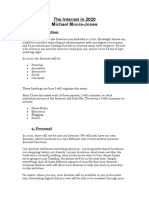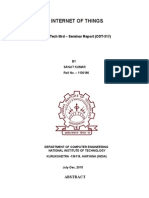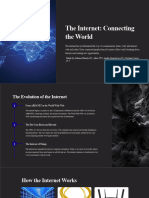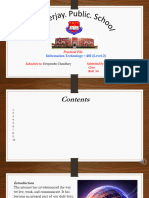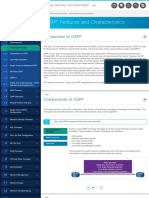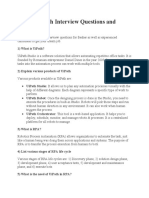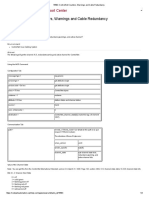Name: RETCHIEL O.
ABOL
Subject: MSIT 625 – INTERNET TECHNOLOGIES
1. How does the internet today change the lives of the people?
The internet has changed our lives in many ways. Over the last century everything in our
lives has become more and more fast paced. Whatever we do, from the way we shop to the way
we do work online and communicate has dramatically changed.
Who would have ever thought we would go to the movie theater less? You literally don’t
have to leave your bed. You can turn on your Hulu, Netflix or whatever app you subscribe to and
find a new or old movie or TV show. The significance of the internet and our newer way of life
is very important not only for the advancement of telecommunications but how we work. We are
able to accomplish more! You can learn, work and communicate with people and business all
over the world with steaming video that’s high speed. You can learn about other cultures with
social media that has become more prominent since 2005. There is always instant message
communication through companies that use Slack and other tools to stay organized and for quick
communication throughout the day. Yes, we could do without the huge amount of
transformation, but who would want to? The internet has been a positive thing and more can get
accomplished in a shorter period. More jobs have been created because of being able to work in a
remote capacity as a result of having excellent broadband internet speeds in their homes.
Many businesses have become more efficient because of high speed internet and its more
effective and reliable communication abilities. This also means personal communications are
more efficient as well. It means you might have a hard time escaping the office. If something can
be accomplished at home, your company may ask you to do so.
These are all things we usually do “out and about” but now almost everything has
become a task you try to accomplish online. We shop differently now and many of us purchase
items at stores that aren’t local. Of course, many of us in the Philippines still go to the food store
on a regular basis, but in larger cities there are more folks doing take-outs and online ordering for
food delivery. Even smaller towns are finally getting more options for delivery if local places
don’t offer it. The Foodpanda and Grab apps are making even more food options available for
wider areas where private business deliver isn’t always available.
The assortment of what you are able to do, order online and make happen in a matter of
minutes or by the click of a button is awesome, yet can be dangerous for compulsive shoppers!
Just over twenty-four years ago in 1995, society was just beginning to be able to talk online in an
instant message window. The shopping, delivery and powerful online video capabilities weren’t
available yet. A major difference before the internet was how we got our news. Most people
either read it in a daily newspaper, physically in their hands, or watched the evening news on
cable television from Fil Products and Sky Cable. Now, because of the Internet we can get news
on our phones online, thru apps or websites, from social media or newsletters in our email inbox.
The news is constant; we have become news hounds and know everything in seconds, mostly
because of social media power.
� The Internet is one of the key factors driving today's economy. No one can afford to be
left behind. Even in a tough macroeconomic framework, the Internet can foster growth, coupled
with enhanced productivity and competitiveness.
2. The change of people's perception and acceptance of the Internet of Things driven by
pandemic.
In recent times, Internet of Things are used in various tech publications. It does have a
meaning; it’s not just a pun. It essentially is referring to all the items we are now able to program
to do things for us our smart phones, special smart TVs, camera systems we can monitor at the
front door to our smart refrigerator and so on. These things may seem neat to have; but what if
everything was like that? These devices would be able to communicate; do whatever you needed.
The point is everything in connected online. This is how the Internet of Things gets its name.
This time of pandemic, to be effective, the Pfizer and Moderna COVID-19 vaccines
(along with many other pharmaceuticals) rely on stringent temperature controls during
transportation and storage. Reports suggest that a quarter of vaccines are degraded by the time
they reach their recipient. To minimize such loss, distributors are placing heat, humidity, motion
and location sensors on the pallets (or even vaccines themselves) so stakeholders can monitor the
vials of vaccine in real time wherever they are in the world and identify weak links in the supply
chain.
There are vast possibilities for wearable devices to help with getting the virus under
control. Wearable devices such as smart watches, smart bracelets and patches are being used for
the detection, monitoring, recovery and management of coronavirus symptoms and effects. Hong
Kong, for example, is using consumer wearables to help enforce coronavirus quarantines – while
Bump uses a combination of wearable devices and data management to help maintain social
distancing in workplaces.
The IoT revolution is reshaping modern healthcare systems by incorporating
technological, economic, and social prospects. It is evolving healthcare systems from
conventional to more personalized healthcare systems through which patients can be diagnosed,
treated, and monitored more easily.
3. The world with the Internet 20 years from now.
Fifty years after the first computer network was connected, most experts say digital life
will mostly change humans’ existence for the better over the next 20 years. However, they warn
this will happen only if people embrace reforms allowing better cooperation, security, basic
rights and economic fairness.
Internet connection will be permanent and automatic. We’ve been “connecting” to the
Internet in various ways, from the minutes-long process of dialing up to the seconds-long process
of entering a Wi-Fi password once for a given location. Eventually, connectivity will be constant
and streamlined to the point where no individual “connection” is really necessary. Universal
�Internet is slowly becoming a reality, and overlap between systems may establish a layer of
redundancy that prevents worries of service outages or bad connections.
Augmented and virtual reality will play a major role. Mobile devices let us access the
Internet in the real world, but next -gen devices will project the Internet, or embed it, into the real
world through a form of augmented reality. Google Glass pioneered this space, while
Microsoft’s HoloLens looks promising to carve the path forward. Though augmented reality has
seen some unsuccessful fits and starts, its close cousin, virtual reality, is starting to see
significant growth amid the launch of Oculus Rift, HTC Vive, and the upcoming PlayStation
VR. The world wasn’t ready for AR a few years ago, but a few years from now, it will be.
Machines might take over your job. Already, machines are capable of many manual
tasks, and they’re starting to gain mastery over high-level and intellectual tasks, like writing.
Combined with the ubiquity of the Internet, these apps will make it so that less work and more
resources are directly available. The need for people to work will decrease along with job
availability (at least, ideally), resulting in a system that’s more or less balanced. As we struggle
to find this balance, we’ll undoubtedly encounter hurdles of joblessness and unbalanced resource
distribution—but these are short-term drawbacks of a more connected, richer world.
Privacy will become commoditized. With a constant (and possibly un-severable)
connection to the Internet and more apps that run our lives, privacy will become an even bigger
concern. It may even be commoditized to the point where only the rich can afford to be off the
grid. As a result, I expect we’ll see a number of independent organizations and companies
striving to maintain some level of privacy for consumers; whether or not they’ll be successful is
another story.
The ‘Internet of Things’ will fully mature. Already, the “Internet of Things” connects
refrigerators, alarm clocks, and various other household appliances. In another 15 years, that
connection will extend to vehicles, wallets, health monitors, and perhaps even our paper
currency. The more freely information flows, the greater power and freedom we have; this truth
will drive our desire to connect everything we can to the Internet.
Businesses and individuals will struggle to adapt to the increasing rate of change. As fast
as we’re already used to technology developing, and as amazing as some of these developments
seem, the pace of development in the future is going to be even more astounding. Thanks to
machine learning and increased computing power, the development of Internet-based
technologies will accelerate to the point that for many, it feels out of control. Businesses and
individuals will struggle to adapt, while self-regulating algorithms and complex interrelated
systems will start changing themselves as necessary. Today’s luddites are often techno-phobes or
frugal consumers unamused by the latest breakthroughs. Tomorrow’s luddites will include these
as well as willing adopters who simply aren’t able to keep pace with the coming changes.
Earth won’t be the only planet with Internet access. Extra-terrestrials aside, Earth is the
only planet with Internet access. By 2030, Mars will have Internet access, too. SpaceX founder
Elon Musk is on a mission to colonize Mars, and I think he’ll succeed. The first Mars settlers
will need to be able to communicate with friends and family back home, and they’ll use the
�Internet to do it. Orbiting satellites around Mars will transmit Internet data back and forth,
though it will take up to 24 minutes for the data to transmit back to Earth (one-way).
I have a good feeling about these predictions (though if I didn’t, I probably wouldn’t have
made them), but of course, they must be taken with a grain of salt. Historically, few predictions
about technological developments prove themselves true—and the ones that do tend to manifest
in ways the predictor didn’t fully expect. There will be twists and turns in the evolution of the
Internet that none of us are currently able to foresee, but one thing’s for sure—in another 15
years, the way we use the Internet may be almost unrecognizable from what we know today.
References:
https://www.bbvaopenmind.com/en/articles/internet-changed-everyday-life/#:~:text=The
%20Internet%20has%20also%20changed,%2C%20smart%20phones%2C%20and%20tablets.
https://www.neosperience.com/blog/10-ways-the-internet-has-changed-the-way-we-live-and-do-
business/
https://360.shiprocket.in/blog/how-internet-changed-our-lives/
http://aasa.ut.ee/augsburg/literature/DENTZEL_BBVA-OpenMind-book-Change-19-key-essays-
on-how-internet-is-changing-our-lives-Technology-Internet-Innovation.pdf
https://www.edge.org/responses/how-is-the-internet-changing-the-way-you-think

